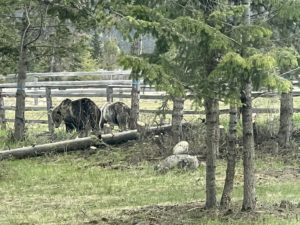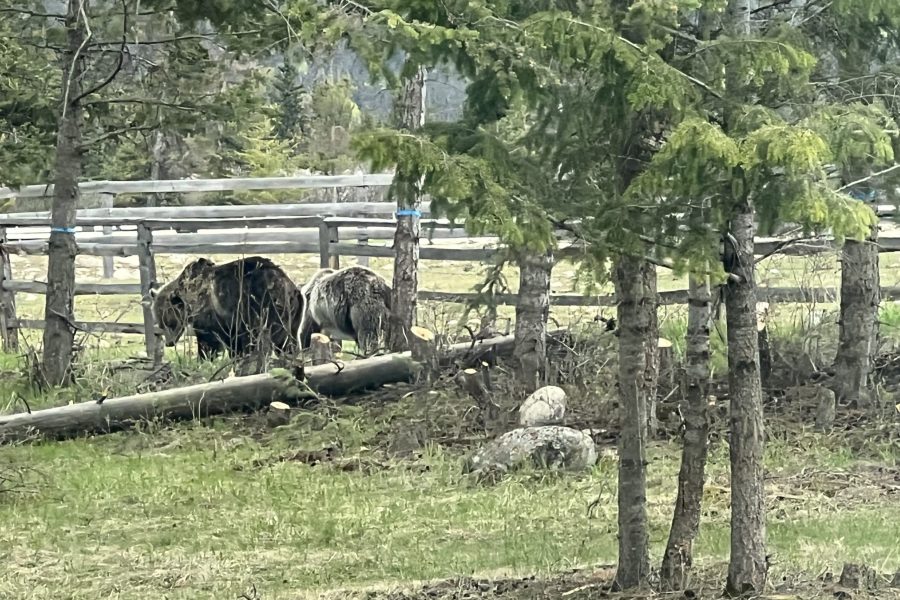I’ve just returned from a train vacation through the Canadian Rockies. They were truly majestic – I felt a little closer to heaven.
Thanks to an unusually cold spring, the Rockies were still snow-capped and glistening. It was also that time of the year when the wildlife was out and about, enjoying nature’s  bounty. I’ve never seen a bear in the wild, but on this trip I actually saw six, including a Grizzley and her cub. Big horn sheep, mountain goats, and bald eagles abound. Against all this was a backdrop of trees, trees, and more trees — I counted about a gazillion. The endless miles of green inspired me to look into Canada’s wildfire prevention efforts. After all, they must be doing something right.
bounty. I’ve never seen a bear in the wild, but on this trip I actually saw six, including a Grizzley and her cub. Big horn sheep, mountain goats, and bald eagles abound. Against all this was a backdrop of trees, trees, and more trees — I counted about a gazillion. The endless miles of green inspired me to look into Canada’s wildfire prevention efforts. After all, they must be doing something right.
But after some reading, it shouldn’t have surprised me that much like California, Canada’s wildfire policies are driven more by climate change, rather than serious, practical efforts to reduce wildfire risks.
Fraser Institute Senior Fellow Robert Murphy, who has also authored several PRI studies, noted that in Canadian Pres. Trudeau’s latest federal budget, he proposes $129 million to help contain potential wildfires, stating that: “Climate change is causing wildfires to become more frequent and more severe across Canada.” But Murphy, in some good old-fashion data collecting, showed that the government’s own numbers reveal that forest fire severity has actually been declining over the past 30 years. Murphy writes, “The plan for additional spending on wildfires may or may not be a good idea, but Canadians shouldn’t be influenced by claims about climate change that are contrary to fact.”
In Murphy’s 2020 study, and based on data from the Canadian National Fire Database, the last 30 years actually saw a downward trend in annual forest fires, whether measured in the number of fires or hectares burned. A ranking of Canadian forest fires in terms of total hectares burned showed that over the entire data set (ranging from 1959 to 2019), the six worst years all occurred prior to 2000.
Murphy does make clear in his study that British Columbia, Alberta, and the Northwest Territories have experienced historically high fire activity in recent years. But he found that the increased fire activity in these three regions is more than counterbalanced by declines elsewhere. He concludes: “As these statistics make clear, the government’s own numbers do not support casual statements about the increasing frequency and severity of Canadian wildfires.
PRI’s own board member, Judge Dan Kolkey, has made similar arguments when it comes to California’s wildfire policies. In his chapter in Saving California (Pacific Research Institute, 2021), he writes that instead of focusing on new strategies to help control the state’s wildfire risk, Gov. Gavin Newsom said that California needs to get more “aggressive” in achieving its target of 100 percent green electricity and that the target date of 2045 is “too late.” Newsom wants to “fast track all of these efforts,” including investing in green energy and “getting more electric cars on the road.”
But as Judge Kolkey reminds us, California only accounts for roughly 1 percent of global emissions. Consequently, “there is no guarantee that the state’s ambitious climate change policy is going to have any effect on arresting climate change, let alone reduce the risk of wildfires,” he writes. Instead, Judge Kolkey makes some serious and practical recommendations that would go a long way in reducing wildfire risks, including thinning forests, hardening homes, and strengthening California’s energy infrastructure.
California’s and Canada’s attempt to thwart climate change through wildfire policies is misplaced at best, and potentially dangerous at worst.
Rowena Itchon is senior vice president of the Pacific Research Institute.


